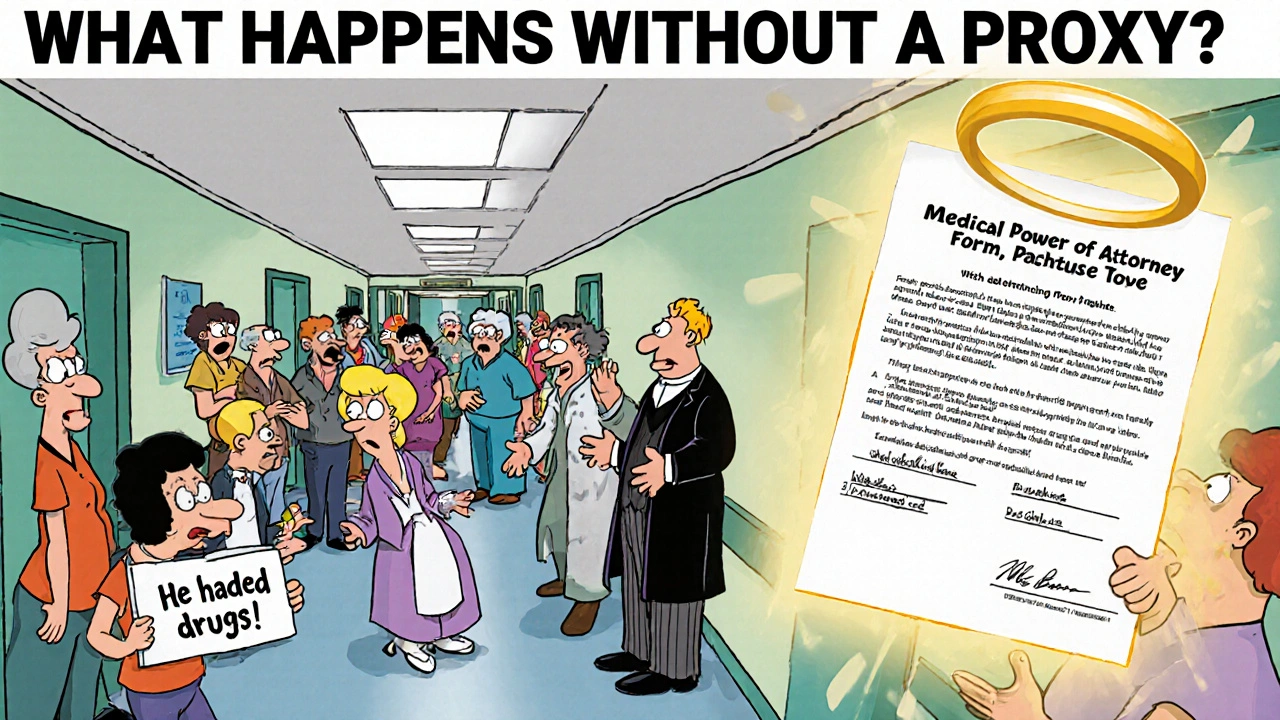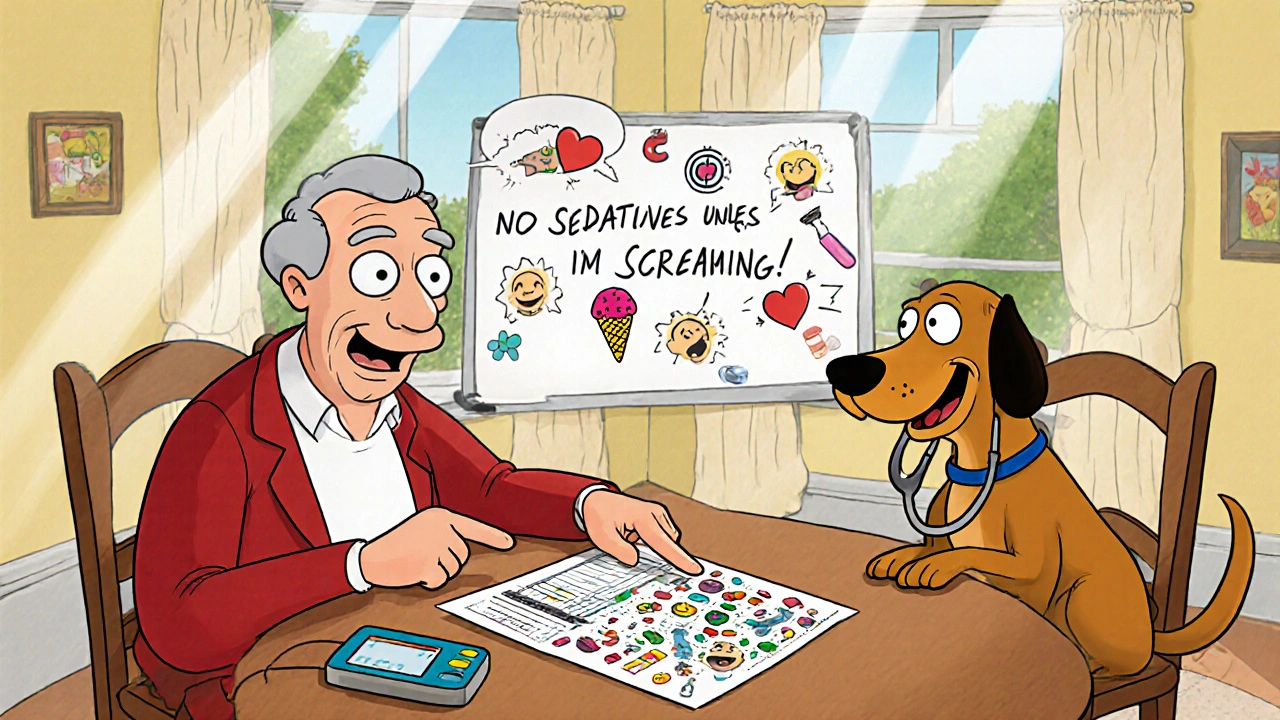What happens if you can’t speak for yourself during a medical emergency? Who decides whether you get that antibiotic, painkiller, or life-sustaining treatment? Without a plan, the answer often falls to strangers - hospital staff, distant relatives, or even judges - not the people who know your values best.
Why Medication Decisions Are the Most Critical Part of a Medical Power of Attorney
Most people think advance directives are about turning off machines. But in real life, the hardest calls are about medication. Should they give you morphine if it might speed up death? Should they stop your blood thinner if you’re bleeding? Should they give you an antipsychotic for agitation in dementia, even if you once said you hated being drugged? A Medical Power of Attorney (also called a Healthcare Proxy) lets you pick someone you trust to answer these questions. It doesn’t kick in until you’re unconscious, confused, or too sick to speak. But when it does, that person becomes your voice. And medication is where families break apart. A 2023 study in the Journal of Pain and Symptom Management found that patients with a named agent had 32% fewer medication disputes during hospital stays. That’s not just about comfort - it’s about avoiding delays in treatment. One nurse on Reddit shared how her mother’s proxy prevented a 12-hour delay in antibiotics during sepsis because the agent knew exactly which drugs were safe.How a Medical Power of Attorney Actually Works
This isn’t just a form you sign and forget. It’s a legal tool that gives your agent the right to:- Decide which medications to give - oral, IV, or injection
- Accept or refuse treatments like antibiotics, chemotherapy, or pain meds
- Access your full medical records
- Choose where you’re treated - hospital, hospice, or home
- Make life-and-death decisions if you’ve given them that authority
What Your Agent Needs to Know About Medications
Most agents don’t know what they’re signing up for. A 2022 survey by The Conversation Project found that 41% of agents felt uncertain about medication preferences. That’s dangerous. Here’s what you need to discuss with your agent - not once, but multiple times:- Which pain meds are okay? (Some people fear addiction more than pain)
- Would you want antibiotics for pneumonia if you’re in late-stage dementia?
- What about blood thinners? Would you accept them if you had a stroke risk but hated bleeding?
- Are you okay with sedatives for agitation, even if they make you sleepy all day?
- What’s your line between comfort and prolonging life?
Medical Power of Attorney vs. Living Will vs. POLST
People mix these up. Here’s the difference:| Tool | What It Does | Best For | Medication Coverage |
|---|---|---|---|
| Medical Power of Attorney | Names a person to make decisions | Everyone, especially those with chronic illness | Full - agent can decide any medication, anytime |
| Living Will | Lists specific treatments you want or refuse | People with clear, fixed preferences | Limited - only covers scenarios you wrote down |
| POLST/MOLST | Doctor-signed orders for current illness | People with serious, life-limiting conditions | Specific - includes exact meds, doses, routes |

Who Should You Choose as Your Agent?
Not your oldest child. Not the one who lives closest. Not the one who’s “good with paperwork.” Choose someone who:- Knows your values - not just your medical history
- Can say “no” to doctors when needed
- Won’t be swayed by family pressure
- Is willing to talk about death
What Happens If You Don’t Have One?
Without a Medical Power of Attorney, decisions go to your next of kin - usually spouse, then adult children. But if they disagree? You get a court-appointed guardian. That takes weeks. And during that time, you might get treatments you’d hate. In one case, a man in Pennsylvania was given antipsychotics for dementia because his two children couldn’t agree. One thought he’d want them; the other said he hated being drugged. The hospital gave them anyway - legally, because no one had authority to stop it. Your family doesn’t need to fight. You can prevent it.How to Get Started (Step by Step)
1. Download your state’s form - search “medical power of attorney [your state] free form.” 2. Have the talk - sit down with your agent. Use real examples: “If I can’t talk and I’m in pain, would you give me morphine?” “Would you want me on a feeding tube if I had a stroke?” 3. Write it down - add notes to the form: “I don’t want sedatives for agitation unless I’m screaming in pain.” “I want antibiotics if I’m likely to recover.” 4. Sign it - follow your state’s rules (witnesses? notary?). 5. Distribute copies - give one to your agent, your doctor, your primary care provider, and keep one at home. Ask your doctor to add it to your medical record. 6. Review yearly - if your health changes, or your agent moves away, or your values shift, update it.
Common Mistakes (And How to Avoid Them)
- Mistake: Assuming your family knows your wishes. Solution: Talk to your agent, then write it down.
- Mistake: Using a generic online form. Solution: Only use your state’s official form.
- Mistake: Not telling your agent about psychiatric meds. Solution: If you’ve ever refused antipsychotics, say so now.
- Mistake: Thinking a living will is enough. Solution: Add a healthcare proxy - it covers the unexpected.
What About Digital Tools?
Apps like PREPARE (free from UCSF) use video scenarios to help you think through choices. One study showed they increased completion rates by 43%. But they don’t replace the conversation. Digital platforms like DocuBank or Everplans store your documents securely and send them to hospitals on demand. But they cost money. Your state form is free and just as valid. Technology helps. But only if you’ve already had the talk.Final Thought: This Isn’t About Dying. It’s About Living With Control.
Planning ahead isn’t morbid. It’s the opposite. It’s saying: “I want my choices to matter - even if I can’t speak.” Medication decisions are where dignity lives. Whether it’s a simple pain pill or a life-sustaining drug, you deserve to decide - not your family, not a judge, not a nurse guessing what you’d want. Take 30 minutes today. Talk to someone you trust. Fill out the form. Give them your voice. It’s the most important gift you’ll ever give them - and yourself.Can my agent override my living will?
No. Your agent must follow your written instructions in your living will. But if your situation isn’t covered - like a new illness or unexpected complication - your agent can make decisions based on what they know of your values. The living will sets boundaries; the agent fills in the gaps.
Can a family member challenge my agent’s decisions?
Yes, but they need to go to court. If your agent is acting in line with your wishes and the law, courts almost always side with them. That’s why clear documentation and prior conversations matter - they protect your agent from false claims.
Do I need a lawyer to create a Medical Power of Attorney?
No. All 50 states provide free, legally valid forms online. A lawyer is only needed if your situation is complex - like having multiple spouses, blended families, or a history of mental health treatment. For most people, a free state form and a good conversation are enough.
Can my agent make decisions about psychiatric medications?
Yes - but some states have special rules. In Indiana and a few others, you must complete a separate psychiatric advance directive if you want your agent to have full authority over psychiatric meds. Always check your state’s requirements. If you’ve ever refused antipsychotics or sedatives, say so clearly in your form.
What if I change my mind after signing?
You can cancel or change your Medical Power of Attorney anytime - as long as you’re mentally capable. Just destroy the old form, tell your agent and doctor, and sign a new one. There’s no penalty. Review it every year or after a major health change.
Will hospitals honor my Medical Power of Attorney?
Yes - by law. The Patient Self-Determination Act of 1991 requires all hospitals receiving Medicare or Medicaid to honor advance directives. Most hospitals now store them electronically. Still, always give a copy to your doctor and keep one at home. Don’t assume they’ll find it in their system.

Mirian Ramirez
I never thought about how meds could be the real battleground in a hospital-like, morphine isn’t just ‘pain relief,’ it’s a moral earthquake. My grandma had dementia and they wanted to give her antipsychotics just to keep her quiet. She used to scream at the TV for no reason, but she’d light up when her grandkids came. I wish I’d written down ‘no drugging her into silence’ before it was too late. Now I’m telling everyone I know: talk to your agent about the little things, not just the big ones.
Kika Armata
How quaint. You assume everyone has access to a ‘free state form’-as if the average person isn’t drowning in medical bureaucracy, insurance red tape, and the crushing weight of American healthcare capitalism. And let’s not pretend a ‘conversation’ with your agent is enough. You need a notarized, HIPAA-compliant, digitally encrypted, blockchain-backed directive-preferably reviewed by a bioethicist with a PhD from Johns Hopkins. Otherwise, you’re just deluding yourself into thinking you have control.
Herbert Lui
There’s something sacred about giving someone the power to say ‘no’ for you. Not because you’re afraid of dying-but because you’re afraid of being reduced to a symptom, a chart, a billing code. I used to think planning for death was morbid. Now I see it as the ultimate act of love. My sister’s my agent. We sat on her porch for three hours last summer, talking about ice cream flavors she’d let me have if I couldn’t chew anymore. She cried. I didn’t. That’s the thing-this isn’t about paperwork. It’s about who you trust to hold your humanity when you can’t hold it yourself.
Nick Zararis
Don’t forget: your agent must be legally appointed-so make sure you follow your state’s witness requirements exactly-otherwise, it’s invalid-no exceptions-no ‘but I thought’-if you don’t have two non-family witnesses in New York-your form is just a napkin-please-please-please-don’t risk it-your family will thank you later-seriously-just do it.
Sara Mörtsell
People act like this is complicated. It’s not. You want control? Name someone who won’t crack under pressure. You want to avoid family drama? Don’t pick your kids. Pick the one who’s already seen you cry over a bad movie and didn’t try to fix it. And stop using those cheesy online forms-your state’s bar association has a PDF that’s been updated since 2021-why are you still using a template from 2015? You’re not saving time-you’re setting up a lawsuit.
Rhonda Gentz
I used to think advance directives were for old people. Then my mom had a stroke at 58. She couldn’t speak. The doctors asked if she wanted antibiotics. We didn’t know. She never said. We said ‘yes’ because we didn’t want to be the ones who let her go. She lived three more months-trapped in a body that didn’t work, surrounded by machines, never able to tell us she wanted to be left alone. I wish I’d asked her about meds. Not just ‘life support.’ The little things. The quiet ones. The ones that matter most when you’re too tired to fight.
Alexa Ara
Just do it. Seriously. It’s 30 minutes. You don’t need a lawyer. You don’t need to be perfect. You just need to start. Talk to your person. Write one line: ‘I don’t want to be drugged to sleep unless I’m screaming.’ That’s enough. Then send them a text: ‘Hey, I just did this. I trust you. Thank you.’ That’s the gift. Not the form. The trust. The words. The courage. You’re not preparing to die-you’re preparing to live with dignity. And that’s worth 30 minutes of your time.
Olan Kinsella
Have you ever watched someone die in a hospital because their daughter didn’t want to be the ‘bad guy’? I have. I was there. The nurse kept asking if they wanted to continue the antibiotics. The daughter kept saying ‘I don’t know.’ The father was in the corner, crying. The patient was awake. Eyes open. Begging with his eyes. And no one had the courage to say ‘no.’ So they gave him more. And more. And more. Until his heart gave out. This isn’t about forms. It’s about bravery. Who in your life has the guts to say no to a doctor? If you can’t answer that-you’re already lost.
Kat Sal
My mom’s agent is her yoga instructor. No joke. She’s not family, but she’s the only person who knew my mom’s real deal: she hated being trapped, she loved the smell of rain, and she’d rather die than be in a hospital bed watching reruns. We all thought it was weird. Until she had the fall. The agent showed up with her lavender oil and said, ‘She’d want peace, not tubes.’ They listened. Mom died at home, listening to birds. No drama. No fights. Just love. So yeah-pick the weird one. The quiet one. The one who sees you.
Nick Zararis
Wait-did anyone mention that if you’re on anticoagulants, you MUST specify whether your agent can override the ‘no blood thinners’ clause if you have a stroke? I’ve seen this go wrong-twice-because people assumed ‘no meds’ meant ‘no pills’-not ‘no IVs’-and then the agent panicked and refused everything-even the clot-busters-and the patient had a massive brain bleed-because they didn’t know the difference-so please-please-please-write it down-exactly-word for word-don’t assume-don’t hope-write it.